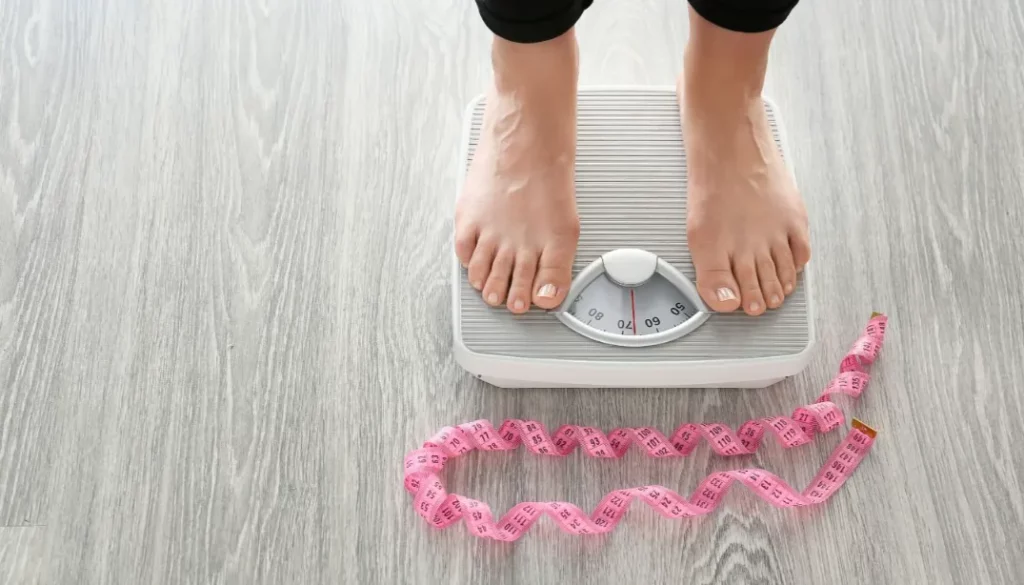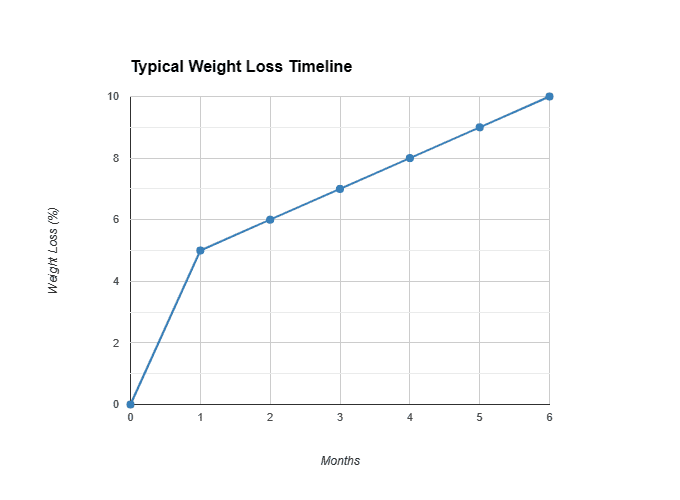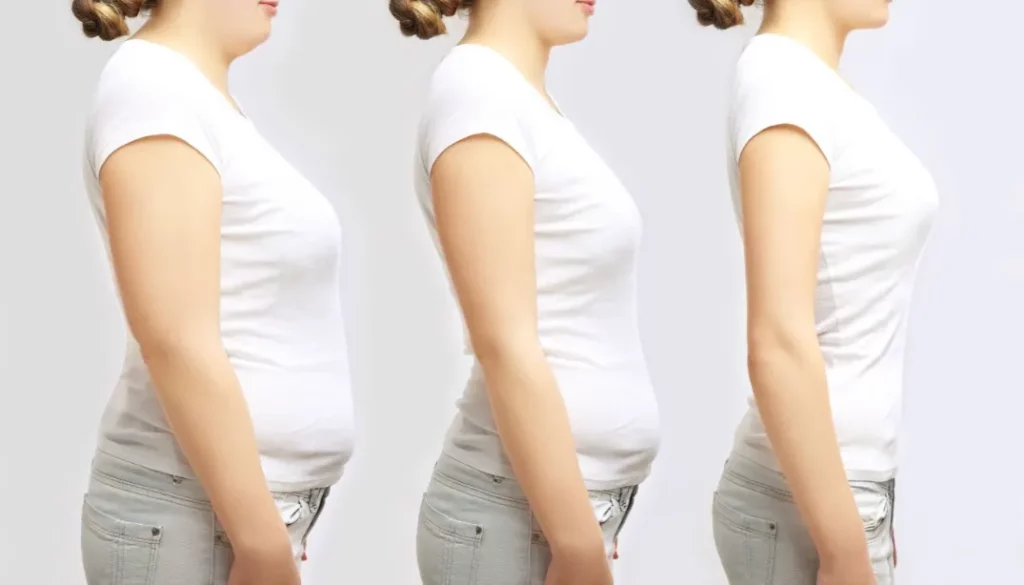How long does it take to see weight loss results? You can see initial changes on the scale in 1-2 weeks, but visible fat loss typically takes 4-6 weeks. A sustainable rate is losing 1-2 pounds per week. Your timeline depends on your diet, metabolism, starting weight, and exercise consistency.
🔑 Key Takeaways
- 1-2 Weeks: Expect initial scale movement, primarily from water weight loss.
- 4-6 Weeks: Visible fat loss and body composition changes become noticeable.
- 1-2 lbs/week: This is the CDC-recommended, sustainable rate for long-term success.
- 6 Key Factors: Diet, starting weight, metabolism, genetics, exercise, and sleep dictate your speed.
- Track Beyond the Scale: Use progress photos, body measurements, and clothing fit for motivation.
What Is Weight Loss?
Weight loss occurs when you burn more calories than you consume. This calorie deficit forces your body to use stored fat for energy. For most people, this is achieved through a combination of dietary changes and increased physical activity.
Weight Loss Occurs When You Burn More Calories Than You Consume
Your body stores excess calories as adipose tissue (fat). Creating a consistent calorie deficit—through diet, exercise, or both—triggers lipolysis, the process of breaking down fat for fuel.
Most People Can Lose Weight by Reducing Calorie Intake and Increasing Activity Levels
The fundamental formula works for most: eat less, move more. Combining a moderate calorie reduction with activities like brisk walking or resistance training creates an effective deficit. However, conditions like PCOS or hypothyroidism can complicate this process, making medical guidance valuable.
Supporting factors are critical. Prioritize 7-9 hours of sleep, manage stress through mindfulness, and focus on whole, nutrient-dense foods to regulate hunger hormones like ghrelin and leptin.
“Weight loss is a journey, not a destination. It’s about making sustainable lifestyle changes that support your overall health and well-being.”
Remember, individual factors like genetics, age, and metabolic health mean everyone’s journey is unique. A patient, consistent approach is the key to lasting results.
Factors That Affect Weight Loss Speed

Your weight loss timeline is not random. It’s dictated by a combination of modifiable and non-modifiable factors. Understanding them lets you set realistic expectations.
The Role of Diet and Metabolism
Diet is the primary driver. A sustained calorie deficit is non-negotiable. Your basal metabolic rate (BMR)—influenced by age, sex, and muscle mass—determines how many calories you burn at rest. Tools like the Harris-Benedict equation can help estimate your needs.
The Influence of Genetics and Starting Size
Genetics can influence fat storage patterns and how your body responds to diet and exercise. Your starting point matters significantly. Individuals with a higher initial body weight may lose pounds more quickly initially due to a larger total daily energy expenditure (TDEE).
The Impact of Exercise and Daily Activities
Exercise amplifies your deficit. A combination of cardio (for calorie burn) and strength training (to preserve metabolically active muscle mass) is optimal. Don’t underestimate NEAT (Non-Exercise Activity Thermogenesis)—the calories burned from daily movement like walking or taking the stairs.
Consulting a registered dietitian or using an app like MyFitnessPal can help you create a personalized, effective plan.
How Long to See Weight Loss Results
The timeline has distinct phases. On average, visible fat loss takes 4–6 weeks. Here’s what to expect month-by-month in 2026.
Creating a daily deficit of 500-750 calories through diet can lead to a loss of 1-3 pounds in the first week, largely from water and glycogen. Approaches like a ketogenic diet may accelerate initial water loss.
A combined strategy of diet, cardio, and strength training yields the best results. After 8 weeks, significant changes in posture, muscle definition, and clothing fit are common.
Substantial fat loss typically requires 3-4 months of consistency. The CDC recommends at least 150 minutes of moderate cardio weekly for health and weight management.
Genetic factors, as studied in research from institutions like Stanford University, account for some variability in response. Medical conditions or medications may also affect pace.
Focus on process-based goals. Regular exercise improves mental health, reducing symptoms of anxiety and depression independent of scale weight.
“The scale doesn’t show fat loss or muscle gain well and should be checked less often. It’s better to focus on the good things exercise does for you.”
Unveiling Weight Loss Reality: Timeline and Expected Progress
This graph illustrates the typical non-linear pattern of weight loss, based on data from “The science of obesity management: an Endocrine Society scientific statement“.

- Months 1-2: Rapid loss of 5-10% of initial body weight is common.
- Months 3-6: Progress slows to an average of 1-2% of body weight per month.
- By Month 6: A total loss of 10-15% of initial weight is a typical, successful outcome.
Initial Weeks: Rapid Water Weight Loss
The first 1-2 weeks often show a dramatic scale drop. This is primarily water weight, not fat. Reducing carbohydrate intake depletes glycogen stores, which hold water, leading to quick loss.
This rapid change can boost motivation. You may notice a flatter stomach or looser clothes. However, understand this phase is temporary. The body loses a mix of water, glycogen, and some fat.
Stay positive but realistic. The goal is transitioning to steady fat loss. Men and individuals with higher starting weights may see more pronounced initial losses.
Stage 2: Slower, Sustainable Fat Loss

After the initial drop, the rate slows to a sustainable 0.5 to 2 pounds per week. This is when true fat loss happens. Exercise becomes crucial to preserve muscle and keep metabolism active.
This is the phase where most weight loss plateaus occur, often due to metabolic adaptation or a need to recalibrate your calorie deficit.
Preserving muscle mass is critical for long-term metabolic health, mobility, and body composition.
- Prioritize Protein: Aim for 0.7-1 gram per pound of body weight to support satiety and muscle repair.
- Strength Train: Engage in resistance training 2-3 times per week to maintain lean mass.
- Reassess Your Deficit: As you lose weight, your TDEE decreases. Adjust your calorie intake or activity level accordingly.
- Stay Hydrated: Adequate water intake supports metabolism and can help manage hunger.
Conclusion
Seeing weight loss results requires patience and a scientific approach. The journey follows a predictable pattern: rapid water loss in weeks 1-2, followed by slower, steady fat loss over months.
Your personal timeline hinges on your starting metrics, diet quality, exercise consistency, and metabolic health. Focus on the sustainable process—a moderate calorie deficit, regular strength and cardio training, and high-quality sleep—not just the scale.
Your next step is to create a simple, actionable plan. Calculate your TDEE, aim for a 500-calorie daily deficit, schedule your workouts, and track non-scale victories. Consistency with these fundamentals is what delivers visible, lasting results.
❓ Frequently Asked Questions
Why did I lose weight fast at first, then slow down?
The initial rapid loss is mostly water weight. As your body adapts and you have less mass to maintain, your metabolism adjusts. This slower phase (0.5-2 lbs/week) is the sustainable fat loss rate.
How can I see results if the scale isn’t moving?
The scale doesn’t differentiate between fat and muscle. Track progress with monthly photos, body measurements (waist, hips), and how your clothes fit. These are better indicators of fat loss.
What is a realistic weight loss goal for 3 months?
A realistic and healthy goal is losing 12-24 pounds in 3 months, based on the 1-2 pounds per week standard. This equates to a 5-10% reduction in body weight for most people.
Does muscle weigh more than fat?
A pound of muscle and a pound of fat weigh the same. However, muscle is denser, taking up less space. Gaining muscle while losing fat can make you leaner without a major scale change.
When should I talk to a doctor about my weight loss?
Consult a doctor before starting if you have a chronic condition (e.g., diabetes, heart disease). During your journey, seek advice if you hit a prolonged plateau despite consistency, or experience fatigue, hair loss, or other concerning symptoms.
References
- How Long Does It Take to Lose Weight? – Health.com
- The 4 Stages of Weight Loss – Healthline
- How Long Does It Take to Lose Weight? – Prevention
- Losing Weight – Centers for Disease Control and Prevention (CDC)
- The Science of Obesity Management – Endocrine Society
- Physiology of Weight Loss – National Institutes of Health (NIH)
- Fitness & Nutrition Research – American Council on Exercise (ACE)
